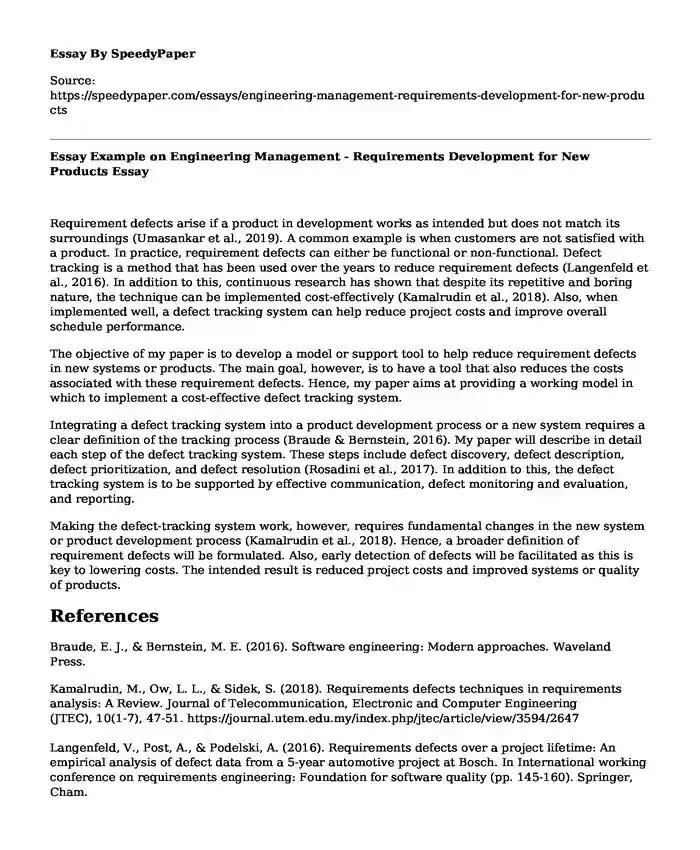
| Type of paper: | Essay |
| Categories: | Management Engineering Customer service |
| Pages: | 2 |
| Wordcount: | 450 words |
Requirement defects arise if a product in development works as intended but does not match its surroundings (Umasankar et al., 2019). A common example is when customers are not satisfied with a product. In practice, requirement defects can either be functional or non-functional. Defect tracking is a method that has been used over the years to reduce requirement defects (Langenfeld et al., 2016). In addition to this, continuous research has shown that despite its repetitive and boring nature, the technique can be implemented cost-effectively (Kamalrudin et al., 2018). Also, when implemented well, a defect tracking system can help reduce project costs and improve overall schedule performance.
The objective of my paper is to develop a model or support tool to help reduce requirement defects in new systems or products. The main goal, however, is to have a tool that also reduces the costs associated with these requirement defects. Hence, my paper aims at providing a working model in which to implement a cost-effective defect tracking system.
Integrating a defect tracking system into a product development process or a new system requires a clear definition of the tracking process (Braude & Bernstein, 2016). My paper will describe in detail each step of the defect tracking system. These steps include defect discovery, defect description, defect prioritization, and defect resolution (Rosadini et al., 2017). In addition to this, the defect tracking system is to be supported by effective communication, defect monitoring and evaluation, and reporting.
Making the defect-tracking system work, however, requires fundamental changes in the new system or product development process (Kamalrudin et al., 2018). Hence, a broader definition of requirement defects will be formulated. Also, early detection of defects will be facilitated as this is key to lowering costs. The intended result is reduced project costs and improved systems or quality of products.
References
Braude, E. J., & Bernstein, M. E. (2016). Software engineering: Modern approaches. Waveland Press.
Kamalrudin, M., Ow, L. L., & Sidek, S. (2018). Requirements defects techniques in requirements analysis: A Review. Journal of Telecommunication, Electronic and Computer Engineering (JTEC), 10(1-7), 47-51. https://journal.utem.edu.my/index.php/jtec/article/view/3594/2647
Langenfeld, V., Post, A., & Podelski, A. (2016). Requirements defects over a project lifetime: An empirical analysis of defect data from a 5-year automotive project at Bosch. In International working conference on requirements engineering: Foundation for software quality (pp. 145-160). Springer, Cham.
Rosadini, B., Ferrari, A., Gori, G., Fantechi, A., Gnesi, S., Trotta, I., & Bacherini, S. (2017). Using NLP to detect requirements defects: An industrial experience in the railway domain. In International working conference on requirements engineering: Foundation for software quality (pp. 344-360). Springer, Cham.
Umasankar, M., Padmavathy, S., & Prakash, N. (2019). Product quality through process improvement-A pathway to zero defects. International Journal of Recent Technology and Engineering, 8(4), 4286-4298. https://www.ijrte.org/wp-content/uploads/papers/v8i4/D8027118419.pdf
Cite this page
Essay Example on Engineering Management - Requirements Development for New Products. (2023, Aug 21). Retrieved from https://speedypaper.net/essays/engineering-management-requirements-development-for-new-products
Request Removal
If you are the original author of this essay and no longer wish to have it published on the SpeedyPaper website, please click below to request its removal:
- Body Language Essay Sample
- Free Essay: The Good Influence of Import Vehicles to U.S
- Essay Sample on the Success of an Organisational Change
- Free Essay: Application for a Graduate Research Executive Position.
- Paper Example - Development and Advantages of Geared Turbofan Engine
- Peroxisomes: Tiny Structures with Big Roles in Eukaryotic Cells - Essay Sample
- Free Paper Sample on Project Deliverables
Popular categories




